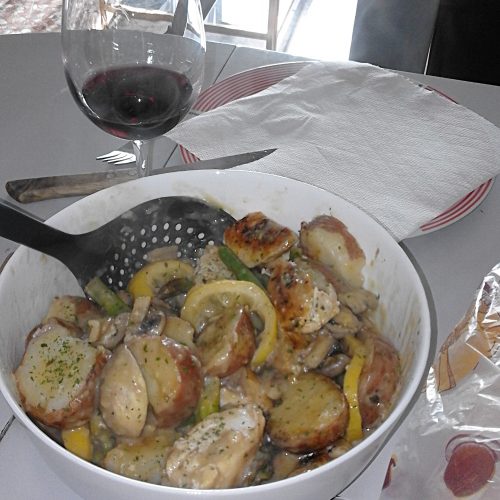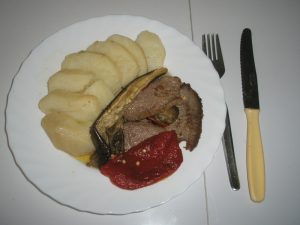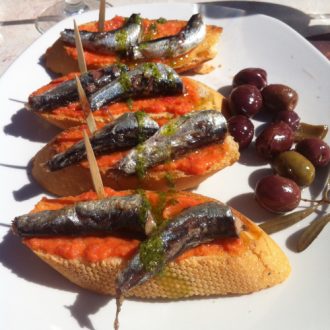
What Does “Buen Provecho” Mean?
Dear Henry,
Have you noticed that sometimes the waiter at restaurants, bars, etc in Spain will tell you “buen provecho” as they deliver your food? At the same time, this is not so common in Spanish homes where, alternatively, you may be told “Que aproveche.” So, what’s the deal? What does buen provecho mean and why is it said in public less than at home? To understand, we’ll have to dive a little deeper into the Spanish language and culture.
What does buen provecho mean?
Literally translated, buen provecho means “good profit” or “good advantage.” However, given the context that this is said around the table when food arrives, it is taken less literally and should be interpreted as a translation of the French ‘bon appétit’ (or “good appetite” for us English-speakers). While we don’t necessarily have a perfect translation in English (and thus will often simply borrow bon appétit), you can interpret this well-wish as something like “Enjoy your meal.”
 Why is this more common in restaurants than homes?
Why is this more common in restaurants than homes?
Now, please note that I am speaking from personal experience and what has been told to me by a Spanish teacher here in Andalucía. I fully recognize that the custom may be different in other parts of Spain, just as I’ve found opinions clearly vary when talking about the use of buen provecho in Spanish-speaking countries as a whole. While some people in the linked forum seem to believe that buen provecho can be taken as inappropriate in formal situations, my experience is that it is the opposite.
Here in Spain, many waiters, owners, and other workers of bars and restaurants will wish you buen provecho when they serve your meal as this is a formal and very well-mannered way to tell you to enjoy your food. The similar structure to the universally recognized bon appétit can also be credited as a reason restaurant staff are likely to use this expression, even if they have spoken English to you at every other stage throughout the meal. It is expected that foreigners may understand its meaning simply from the context and similarity to bon appétit.
Why do some people say ‘Que aproveche’ instead?
On the other hand, “que aproveche” may be the more common expression used in Spanish homes and among friends in less formal situations. To understand this slight difference, we must take into consideration the vocabulary and grammar. This version comes from the Spanish verb aprovechar, which means “to take advantage of,” and is said in the subjunctive voice (which is used to express desires). It is therefore a wish that you “take advantage of” the food in front of you or “make the most of” this meal.
The difference is that this form implies that one should make the most of this meal right now because it’s not promised tomorrow. For some people, this version therefore carries a lower-economic status connotation, implying that plentiful food is not always available (which was the case for many families, especially during the Spanish Civil War).
 So, what should I say?
So, what should I say?
Because of this potential interpretation, my Spanish teacher warmed us that, if invited into the home of a Spanish family (perhaps for a Sunday meal), we should not use ‘que aproveche’ unless it is said to us first as it could be taken as slightly offensive. On the other hand, she explained that most Spaniards tend to be humble and have likely grown up saying ‘que aproveche’ without attaching any negative feelings to it. Thus, one of the family members will likely say this to us as a general ‘dig in’ sort of invitation and if that happens it is appropriate and expected to echo it back.
When in a restaurant, I’ve experienced it both way—most often the waiter will say “buen provecho” when serving the food however when I’m at a local, more casual spot with Spanish friends it is also not uncommon for the waiter to be less formal in saying “que aproveche.” In either case, I recommend responding with “gracias” (thank you) to anyone who is not eating with you and “igualmente” (same to you) or a repetition of whichever version was used (“buen provecho” or “que aproveche”) to people who are sharing the meal with you.
But, please, do not fear that you will highly offend someone if you switch up the forms (something that I have done more than once when trying to remember which one to use in which situation)! For the most part, people do not take either to be inappropriate and, seeing as you are not a native-speaker, will understand that you are making an effort at good etiquette, not trying to insinuate they are poor!
Hope that helps and, please, let us know if your experience with buen provecho has been different!
Sincerely,
Spain





5 Comments
Oaguilar92@Yahoo.com
It means to get benefit from your meal, restoring your body strength while enjoying it.
Sincerely, Spain
Hey Orly,
Thanks for sharing this with us! We hope you find other posts interesting as well!
Dani and Claudia
Javier Beringola
Hola, es todo correcto menos una cosa. " Que aproveche!" se dice todo junto. Jamás he oído a nadie en ninguna parte de España decir "aproveche!" y es incorrecto en el contexto de comida. Además, suena mal y puede significar otras cosas como bien explica el artículo.
Saludos de Javier Beringola.
mebrenner@gmail.com
Excellent analysis of the uses of "buen provecho" and "que aproveche."